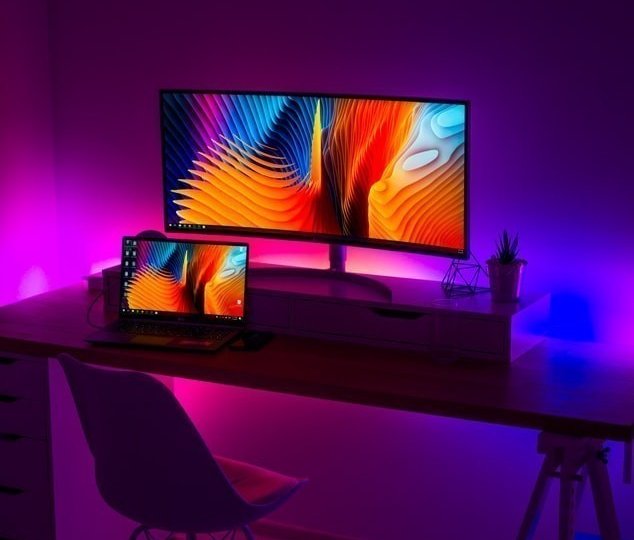
Best Desktop Pcs for Home, Office, Gaming 2023





A desktop PC, or personal computer, is a type of computer that is designed for use in a fixed location, such as a home or office. It is typically larger and more powerful than a laptop or tablet, and is often used for tasks that require significant processing power, such as video editing, gaming, and graphic design.
Desktop PCs come in a variety of configurations, with different specifications such as processing power, memory, storage, and graphics capabilities. They can be purchased pre-assembled from manufacturers such as Dell, HP, and Apple, or can be custom-built by assembling individual components.
One of the main benefits of a desktop PC is its ability to be easily upgraded. Unlike laptops, which have limited upgradability, desktop PCs can be easily upgraded with new components such as more memory, a faster processor, or a better graphics card.
Connectivity: Desktop PCs usually have a variety of connectivity options, including USB ports, Ethernet ports, and expansion slots for adding additional components. They also often include built-in Wi-Fi, which allows them to connect to the internet wirelessly.
Expandability: One of the key advantages of desktop PCs is their expandability. You can easily add additional components such as additional hard drives or solid-state drives (SSDs) for more storage, or upgrade the graphics card for better performance. This allows you to customize your computer to meet your specific needs and keep it up-to-date as technology evolves.
Performance: Desktop PCs generally offer more performance than laptops, thanks to their more powerful components and more efficient cooling systems. This makes them well-suited for demanding tasks such as video editing, gaming, and 3D modeling.
Multiple Monitor Support: Many desktop PCs can support multiple monitors, which allows you to have multiple screens for increased productivity or for a more immersive gaming experience.
Cost: Desktop PCs can be more affordable than laptops, especially when it comes to high-end models with top-of-the-line components. You can often purchase a high-performing desktop PC for less than the cost of a comparably performing laptop.
Noise Level: One potential drawback of desktop PCs is that they can be noisy, due to the fans and other components used to cool the computer. If you’re looking for a quiet computer, you may want to consider a laptop or an all-in-one desktop, which are designed to be quieter.
Power Consumption: Desktop PCs can be more power-hungry than laptops, which can result in higher electricity bills. However, many desktop PCs come with power-saving features, such as the ability to adjust the speed of the fan, that can help reduce energy consumption.
Size: Desktop PCs can be larger than laptops, which can be a consideration if you have limited space. However, many desktop PCs come in compact form factors that are designed to take up less space on your desk.
Longevity: Desktop PCs can have a longer lifespan than laptops, due to the ease with which they can be upgraded. You can simply swap out old components for new ones as technology advances, which can help extend the life of your computer.
Support: Desktop PCs often come with better technical support and warranty options than laptops, since they are typically sold by well-known manufacturers. This can give you peace of mind and make it easier to get help if you need it.
Customizability: Desktop PCs offer a high level of customizability, which allows you to choose the components that best meet your needs. For example, you can choose a processor that provides the performance you need, or a graphics card that can handle demanding games or applications.
Upgradeability: As technology advances, you may need to upgrade your computer to keep up with new software or to improve its performance. With a desktop PC, this can be as simple as swapping out components, such as adding more memory or a faster graphics card.
Compatibility: Desktop PCs are generally compatible with a wide range of hardware and software, which can make it easier to find compatible components or accessories. This can be especially important if you’re looking to use specialized hardware, such as a high-end gaming mouse or a specialized video card.
Reliability: Desktop PCs are generally considered to be more reliable than laptops, since they are designed to be used in a fixed location and don’t need to be transported. This can make them a better choice for critical tasks, such as rendering a large video project or running a mission-critical application.
Performance: Desktop PCs generally offer better performance than laptops, due to the more powerful components they can use. This can make them well-suited for demanding tasks, such as video editing, gaming, and 3D modeling.
A desktop PC is typically comprised of several different components, including:
Processor (CPU): The central processing unit (CPU) is the brain of the computer, responsible for executing instructions and performing calculations. The central processing unit (CPU) is the most important component of a computer, as it determines the overall performance of the system. The CPU is responsible for executing instructions and performing calculations, and it’s often referred to as the “brain” of the computer. When choosing a CPU, consider factors such as clock speed, number of cores, and cache size.
Motherboard: The motherboard is the main circuit board of the computer, which houses the CPU, memory, and other components. The motherboard is the main circuit board of the computer and acts as a hub for all other components. It houses the CPU, memory, storage, and other components, and connects them all together. There are many different types of motherboards, each with different features and capabilities, so it’s important to choose one that is compatible with your intended use and budget. The motherboard connects all of the components together and determines what components are compatible with each other. When choosing a motherboard, consider factors such as the socket type, number of RAM slots, and available expansion slots.
Memory (RAM): Random Access Memory (RAM) is a type of computer memory that is used to temporarily store data and instructions for the CPU to access. Random Access Memory (RAM) is a type of computer memory that is used to temporarily store data and instructions for the CPU to access. The more RAM you have, the more programs you can run simultaneously without slowing down the computer. When choosing RAM, consider factors such as the type (DDR4, DDR5, etc.), speed, and capacity.
Storage (Hard Drive or SSD): The storage component of a computer is where your data and files are stored. There are two main types of storage: traditional hard disk drives (HDD) and solid-state drives (SSD). Hard disk drives are less expensive and have a larger capacity, but they are slower and less reliable than SSDs. SSDs are faster, more reliable, and offer lower latency, but they are more expensive and have a smaller capacity. When choosing storage, consider factors such as capacity, speed, and cost.
Graphics Card (GPU): The graphics card (GPU) is responsible for rendering images and video on the computer screen. If you plan on using your computer for gaming or demanding graphical applications, a dedicated graphics card is recommended. When choosing a GPU, consider factors such as the GPU architecture, memory capacity, and clock speed.
Power Supply Unit (PSU): The power supply unit (PSU) provides power to the various components of the computer. When choosing a power supply, consider factors such as the maximum power output, efficiency, and number of available connectors.
Optical Drive: An optical drive is an optional component that can be used to read and write CDs, DVDs, and Blu-ray discs. Optical drives are becoming less common in modern computers, as most data is now stored and transferred digitally.
Case: The case is the physical enclosure that houses the motherboard, power supply, and other components. When choosing a case, consider factors such as the size, cooling capacity, and ease of access.
Peripherals: Peripherals are devices that are connected to the computer, such as a keyboard, mouse, speakers, and monitor. When choosing peripherals, consider factors such as compatibility, features, and price.
Trademark Disclaimer:
All trademarks, logos, and brand names are the property of their respective owners. All company, product, and service names used in this website are for identification purposes only. Use of these names trademarks, and brands, specifications do not imply endorsement.




